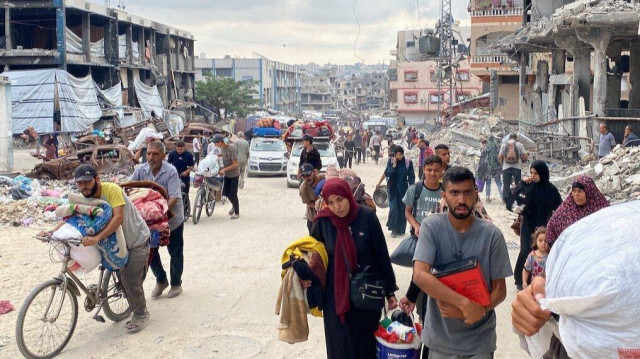
Nearly 42,000 people, mostly women and children, killed in Israeli genocide amid massive destruction across enclave
One year into a devastating Israeli war, hundreds of thousands of Palestinians continue to be forcibly displaced across the Gaza Strip amid destruction, hunger, and fear.
The Israeli army launched a brutal offensive on Gaza following a Hamas attack on Oct. 7, 2023, killing nearly 42,000, mostly women and children, and injuring 97,100 others.
The Israeli genocide has displaced almost the entire population of the territory amid an ongoing blockade that has led to severe shortages of food, clean water, and medicine
The assault has caused massive destruction across the Palestinian enclave with the UN estimating the debris of destroyed buildings at over 42 million tons.
The UN estimates that over 163,000 buildings, or two-thirds of pre-war structures in Gaza, have been damaged or flattened in the Israeli war.
Gaza's government media office also said that 611 mosques and three churches were destroyed and 214 other mosques partially damaged in Israeli attacks.
The genocide has also wiped out 206 archaeological and heritage sites alongside 36 sports facilities, stadiums, and gyms.
Massive destruction
According to the UN agency for Palestinian refugees (UNRWA), around 67% of Gaza's water and sanitation facilities have been either destroyed or damaged in the Israeli war.
The Central Bureau of Statistics and the Palestinian Environment Quality Authority estimated in June that Gaza's available water supply had decreased to 10-20% of pre-war levels.
This has caused a 94% decrease in the amount of water available to Gaza's population, with residents now barely able to access 4.74 liters per person per day – well below the 15-litre minimum recommended by the UN World Health Organization.
Anti-poverty group Oxfam said that 88% of Gaza's water wells and 100% of desalination plants have been either damaged or destroyed, leading to an 84% drop in water production.
The external water supply from Israel's Mekorot water company has also been slashed by 78%.
According to Oxfam, Israel has destroyed 70% of Gaza's sewage pumping stations and 100% of its wastewater treatment plants and water quality laboratories.
This has led to raw sewage flooding streets and refugee camps, a situation expected to worsen during the winter months, increasing the risk of disease outbreaks among the displaced population.
Gaza's education sector has not also been spared the Israeli attacks, with 125 schools and universities completely destroyed and 337 others damaged.
Additionally, 201 government facilities have been entirely leveled, further crippling the territory's ability to provide public services.
The Israeli assaults and blockade have also caused diseases to spread across the Palestinian enclave.
By July, more than 25% of Gaza's population suffered from serious, preventable illnesses caused by sewage contamination and water shortages, Oxfam said.
According to Gaza's government media office, over 1.73 million people have contracted infectious diseases.
In August, polio reemerged in Gaza for the first time in 25 years, prompting international health organizations to launch emergency vaccination campaigns.
Hunger
Israel's crippling siege on Gaza has caused widespread hunger across the Palestinian enclave.
Since the start of the Israeli war last year, at least 36 children have died from malnutrition amid the worsening food crisis in the area.
UNRWA reported in June that over 50,000 children in Gaza were in urgent need of treatment for acute malnutrition.
According to Oxfam, 1 in 5 people in Gaza faces “catastrophic levels of hunger.”
The World Food Program also estimates that half a million Gazans are experiencing extreme food insecurity.
Economic devastation
The Israeli genocide has also decimated Gaza's economy, with factories, farms, and fishing markets destroyed.
Initial estimates from Gaza's government media office place the economic losses at $33 billion.
By January, the Israeli onslaught had wiped out two-thirds of the jobs that existed before the war, driving unemployment from 45% to 80%, according to the International Labour Organization.
The UN Conference on Trade and Development (UNCTAD) reported that poverty in Gaza has soared to 100%, up from 50% before the genocide.
UNCTAD also reported that 80-96% of Gaza's agricultural assets, including irrigation systems, livestock farms, and orchards, have been damaged or destroyed.
This has exacerbated food insecurity, with 82% of Gaza's businesses now in ruins, further cementing the region's economic collapse.
Genocide
The brutal Israeli war has prompted South Africa to file a case at the International Court of Justice (ICJ) in The Hague accusing Israel of committing genocide in Gaza.
Several countries have joined the genocide case against Israel, including Türkiye, Nicaragua, Spain, Mexico, Libya and Colombia.
Last May, the top UN court ordered Israel to halt its offensive in the southern Gaza city of Rafah. It was the third time the 15-judge panel issued preliminary orders seeking to rein in the mounting death toll in Gaza and alleviate humanitarian suffering in the blockaded enclave.
The devastating offensive has triggered mass protests across the world demanding an immediate end to the Israeli war on the Palestinian enclave.
As Israel's genocide on Gaza continues, international recognition of the Palestinian state and support for its bid for full United Nations membership has grown.
In May, Spain, Norway, and Ireland officially recognized the state of Palestine, followed by Slovenia and Armenia in June. This brought the total number of countries recognizing Palestine to 149 out of the 193 member states of the UN.
Mediation efforts led by the US, Egypt, and Qatar to reach a cease-fire and prisoner swap agreement between Israel and Hamas have failed over Israeli Prime Minister Benjamin Netanyahu's refusal to halt the war.

